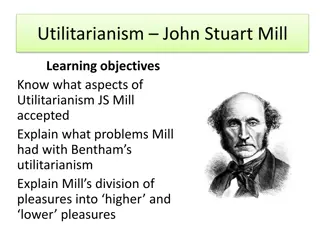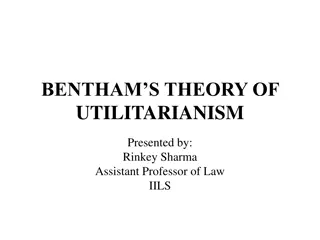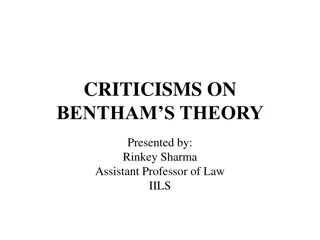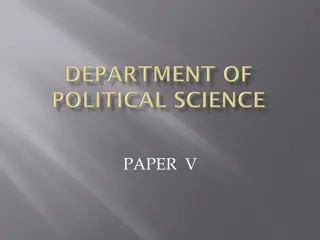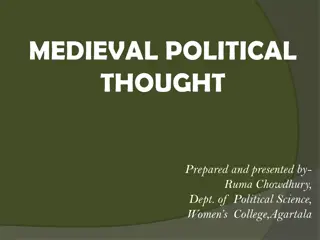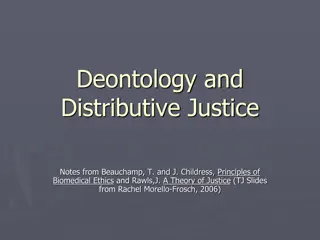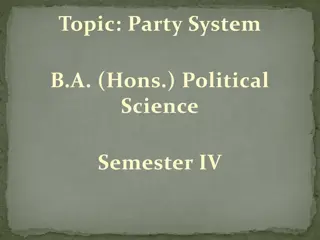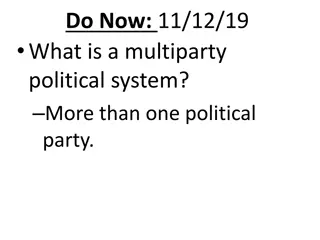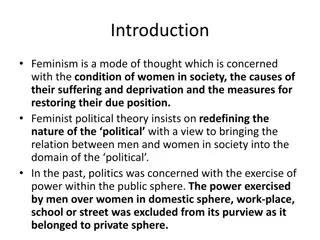Jeremy Bentham's Impact on Political Thought and Utilitarianism
Jeremy Bentham, a notable figure in Anglo-American philosophy of law, was a key proponent of utilitarianism. He emphasized maximizing happiness for the greatest number of people, critiqued laws, and advocated for legal reforms. Bentham's works reflect the societal changes during his time, addressing issues like the Industrial Revolution. While his political ideas have faced misinterpretations, his focus on government's role in safeguarding personal security and well-being remains significant. Pleasure and pain were central to Bentham's political thought, as he believed they could be objectively measured to assess actions. His legacy influenced thinkers like John Stuart Mill and John Austin.
Download Presentation

Please find below an Image/Link to download the presentation.
The content on the website is provided AS IS for your information and personal use only. It may not be sold, licensed, or shared on other websites without obtaining consent from the author. Download presentation by click this link. If you encounter any issues during the download, it is possible that the publisher has removed the file from their server.
E N D
Presentation Transcript
Jeremy Benthams Political Thought
Brief Biography Jeremy Bentham is a leading theorist in Anglo-American philosophy of law and one of the founders of the ethical theory called utilitarianism, which is a principle requiring that that which favours that largest number of people by bringing the greatest happiness is the right action to pursue. Jeremy Bentham was an English Philosopher and was born, in Houndsditch, on 15 February 1745 and lived till the June 6 year 1832. He entered Westminster School at 7 and Queen s College, Oxford at 12 and was admitted to Lincoln s Inn to study law. Although he was the son and grandson of attorneys he however did not practice law. His love and exposure to the works of the main thinkers of the European Enlightenment ( through works of Beccaria, Helvetius, Diderot, D Alembert, and Voltarie) and the works of Locke and Hume led him to choose to become a reformer rather than practice the law. However, even though he did not practice law, he was into philosophy of law, and he spent a lot of time to criticising existing laws and various accounts of natural law and strongly advocating legal reforms.
Jeremy Bentham lived at a time of major social, political and economic change. And thus reflecting in his works are: issues about the Industrial revolutions, which was accompanied by massive economic and social shifts, the rise of the middle class, and revolutions in France. Jeremy Bentham was given to intensive study and often spends as much as eight to twelve hours a day reading and writing. Although his influence while alive was not much truth is that he was influential to followers like John Stuart Mill, and John Austin and other consequentialists.
While there is a lot of misinterpretation and contestation of Bentham s Political Ideas, yet Bentham is an important liberal thinker with a commitment to the role of government in defending personal security and well-being and at the same time with a strong scepticism about government as a vehicle of harm as well as good. He was a thinker that was given to proposing various practical ideas aimed at reforming social instititutions.
Main Works of J. Bentham A Fragment of Government An Introduction to the Principles of Morals and Legislation
Central position of his political though The notion of pleasure and pain occupies a central position in the political thought of Jeremy Bentham that he believes that pleasure and pain can be measured and used to judge or determine which action should be taken and which should be avoided. For him, pleasure and pain are objective states and can be measured in terms of their intensity, duration, certainty, proximity, fecundity, and purity which will make it possible for an objective determination of an activity or state and for a comparison with others. Central also to his political thought is the believe that the individual is supreme. The individual human being is conceived as the source of values and as himself the supreme values. meaning the individual is the ultimate values. As a result of this belief, Bentham is of the view that the nature of the human person can be described without recourse to his social relationship with others. TO him, the idea of relation, and of community are fictitious ideas
Three items have consequently been identified as the basis of Bentham s moral philosophy and political thought and they are: 1. the greatest happiness principle 2. universal egoism 3. artificial identification of one s interests with those of others.
Psychological Hedonism/ Human Nature Jeremy Bentham is a psychological hedonist. Hedonism is the position that pleasure is the moral justification for pursuing any action. There are two forms: Ethical Hedonism and Psychological Hedonism Ethical Hedonism is the position that the only action that is morally justified is that action that brings about pleasure; while any action that produces pain should be avoided. On the other hand, psychological Hedonism is a descriptive theory which seeks to explain how humans behave. It is the position that human being have a nature such that they are always pursuing pleasure in all that they do.
Bentham believes that just as we can explain nature through Physics laws so can human nature be understood through the reference to two primary motives of pleasure and pain According to Bentham, Nature has placed mankind under the governance of two sovereign masters, pain and pleasure. It is for them alone to point out what we ought to do, as well as to determine what we shall do. On the one hand the standard of right and wrong, on the other the chain of causes and effects, are fastened to their throne. They govern us in all we don, in all we say, in all we think Thus, from this position it is obvious that Bentham is of that humans are capable of no action except they take into consideration they pain or the pleasure that it will bring to them.
Apart from being regarded as a psychological hedonist however. J. Bentham may also be regarded Psychological egoism is the position that human beings are by nature beings that pursue their own interests. For him, Self-regarding interest is predominant over social interest, each person s own individual interest over the interests of all other persons taken together. Thus in his belief, human being are by nature who pursue their own interests. This fundamental and reason is even subject to this law of nature for humans. as a psychological egoist.
Utilitarianism One theory which Bentham champions is the theory of Utilitarianism. This is the theory that holds that good is the largest amount of utility or happiness, and that means the sum total of the happiness of all people concerned, and the right, or fundamental duty, is to create as much of the good as is possible whenever we act In other words, an action is morally right if it promotes the greatest number of pleasure or happiness for the greatest number of people. By utility, Bentham was not merely referring to the extent to which things are useful but the their ability to produce the greatest amount of happiness, which is about the presence of pleasure and absence of pain.
Although Bentham believes that the individual is the most important in the society, he believes that individuals will pursue general happiness because the interest of others in inextricably tied with theirs. The principle of utility presupposes that one man is worth just the same as another man, and thus in calculating utility no man s interest will supersede anyone s in order to use the calculus
A review of the legal system Bentham is classified as one of those known as the philosophic radicals. a central position of this group is the belief that many of the social problems of late eighteen and early nineteenth century England were due to and antiquated legal system and to the control of the economy by a hereditary landed gentry opposed to modern capitalist institutions. For Bentham, the principles that control morals also control politics and law and this makes political reforms to require a clear understanding of human nature. Bentham criticised Sir William Blackstone s defence of tradition in law and argued for the rational revision of the process of determining responsibility and punishment and a more extensive freedom of contract. If this is done, he believe it will be in favour of the community and the individual.


